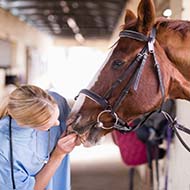RCVS announces first in-person appearance at BEVA Congress

BEVA Congress marks the first opportunity for the profession to get back together since the start of the coronavirus pandemic.
The first in-person appearance of the RCVS at a veterinary event in two years is due to take place next month at the 2021 British Equine Veterinary Association (BEVA) Congress.
BEVA Congress takes place over three days in September (5-7) at Birmingham’s ICC Arena, marking the first opportunity for the profession to get back together since the start of the coronavirus pandemic.
During the event, RCVS staff will be on hand with both a physical and a virtual stand to provide an overview of some of the current major projects being carried out by the College and answer questions from delegates.
Among the projects being showcased will be the recently-launched Veterinary Graduate Development Programme (VetGDP), the new MMI App, the Veterinary Nursing Diamond Jubilee programme and the ViVet innovation initiative.
The RCVS will also be promoting its upcoming RCVS Fellowship Week and the Mind Matters Mental Health Research Symposium.
“After such a long absence, the RCVS team is really looking forward to being back at an in-person event, and we look forward to welcoming the professions to the stand,” commented Angharad Belcher, RCVS Director for Advancement of the Professions.
“It has been an extremely busy year across the various departments at the College, and while we have been able to host meetings virtually, we are glad to be able to talk to vets and nurses in person and to share updates and news.
“Currently we are celebrating the 60th Anniversary of Veterinary Nursing and the development of the new MMI Kite App for wellbeing and we also have further events and activities planned, so follow us on social media for more news and updates.”



 The latest
The latest